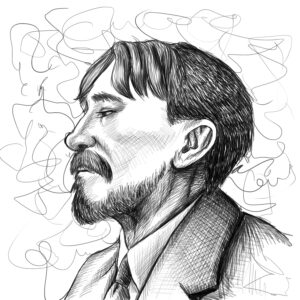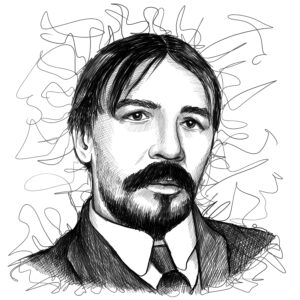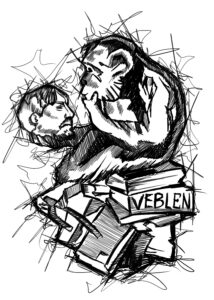 Within Veblen’s cosmological approach, drawing from biological, social, and material sciences, his broader context was the Western world, but his specific application focused on the American version. He called the American socioeconomic system the “Pecuniary Culture,” a system built on monetizing all aspects of the “scheme of life.” At the top of this system was what Veblen termed the “Leisure Class.” The key characteristic of this class is its exemption from the toil required of the common man, achieved by virtue of their inherent prowess within the prevailing “knowledge and beliefs” and the “State of the Industrial Arts” systems.
Within Veblen’s cosmological approach, drawing from biological, social, and material sciences, his broader context was the Western world, but his specific application focused on the American version. He called the American socioeconomic system the “Pecuniary Culture,” a system built on monetizing all aspects of the “scheme of life.” At the top of this system was what Veblen termed the “Leisure Class.” The key characteristic of this class is its exemption from the toil required of the common man, achieved by virtue of their inherent prowess within the prevailing “knowledge and beliefs” and the “State of the Industrial Arts” systems.
Behavioral Roots of the Vested Interests
The mechanism by which these socioeconomic elites capture wealth was what Veblen referred to as “Vested Interests,” the custodians of the “Kept Class.” The vested interests aim to extract private gain from the collective stock of knowledge and technology produced by the community at large. Veblen defined this wealth generated by the community as “Free Income.” This efficiency is made possible by the instinctual human behaviors Veblen identified as “Idle Curiosity,” “Workmanship,” and “Altruism (Parental Bent).” For the common man, the actions of the vested interests define the conditions of their scheme of life.
The vested interests operate within biologically driven predatory behaviors inherited from our evolutionary roots. They do not function in a vacuum of raw predation; rather, they act freely within the prevailing belief system. While the structures, players, roles, and rules of the vested interests evolve within a given civilization, their foundational logic remains. In earlier human societies, vested interests may have stemmed from perceived prowess in hunting, theology, or monarchic authority. But within the post-industrial pecuniary culture, they first emerged as what Veblen called “Captains of Industry,” later evolving into “Captains of Finance.” These elites are held in esteem and honor, thereby generating emulative behaviors within the broader community.
The new vested interests, operating through business and finance, initially capitalized their free-income wealth from the productivity of the tangible industrial system. As the pecuniary culture evolved, a new form of free-income wealth emerged, capitalizing on intangibles such as equities, brands, rights, privileges, and other financial and legal instruments.
Back to the Future
In our modern American pecuniary culture, the belief system operates on the core principles of equal opportunity, self-help, free bargaining, and ownership, originating from the Natural Rights philosophy of the 18th century. These European philosophical ideas about human nature, transposed into the American context, forged a strong animism of an individualist, masterless class within a “live and let live” social order.
This liberal foundation created a system driven by self-interest, a mechanism enabling the vested interests in their quest to “get something for nothing.” These core values underpin the American socioeconomic system, including principles of trade, industry, investment, credit obligations, and other economic institutions. Vested interests in America manifest in many shapes and forms, from media, sports, and entertainment to politics, government, and warfare. They also include the “enlightened” vested interests claiming to protect the environment, the poor, labor, consumers, politics, and government.
This clash between 18th-century beliefs and 20th- and 21st-century technological realities was at the heart of Veblen’s socioeconomic cosmology. Veblen argued that this older definition of human nature failed to align with emerging sciences, anthropology, biology, psychology, zoology, revealing deeper truths about human behavior. The rapid changes brought by knowledge and technology outpaced our belief systems. These vested interests collectively impose a significant overhead on the broader community through their control of tangible and intangible assets.
The legal system reinforces these structures, enabling vested interests to capture wealth through control of intangibles such as brands, monopolies, rights, legal maneuverings, equities, and other pecuniary instruments. Within the pecuniary culture, capturing intangible value is viewed as productive work.
Vested Interests at the Civilization Level
Ownership and control by vested interests affect all aspects of daily life in America, governing its economic traffic to charge “what the traffic will bear.” Within the modern American pecuniary culture, society is divided into two classes: those who own wealth in large holdings, thus controlling the conditions of life for others; and those who do not own wealth in sufficiently large holdings, and whose conditions of life are controlled by others.
Yet the so-called “democratization” of financial instruments, via 401(k)s, IRAs, brokerage accounts, and similar vehicles, has extended participation in these new forms of free-income wealth to a broader class of Americans.
At the civilizational level, vested interests operate parasitically within the host community, extracting wealth from the productive work of the collective. Within the pecuniary culture, this extraction is sanctified by the belief system it inhabits. As a result, their activities generate esteem, honor, and respect from the community as they control the flow of goods and services. As a civilization’s productivity grows, the vested interests capture ever more free income, leading to higher concentrations of control, power, and wealth.
Left unchecked, this process progressively constricts the very mechanisms that generate our collective stock of knowledge and technology. In turn, the civilization gradually degrades under the tightening grip of vested interests over its progressive human behaviors.



